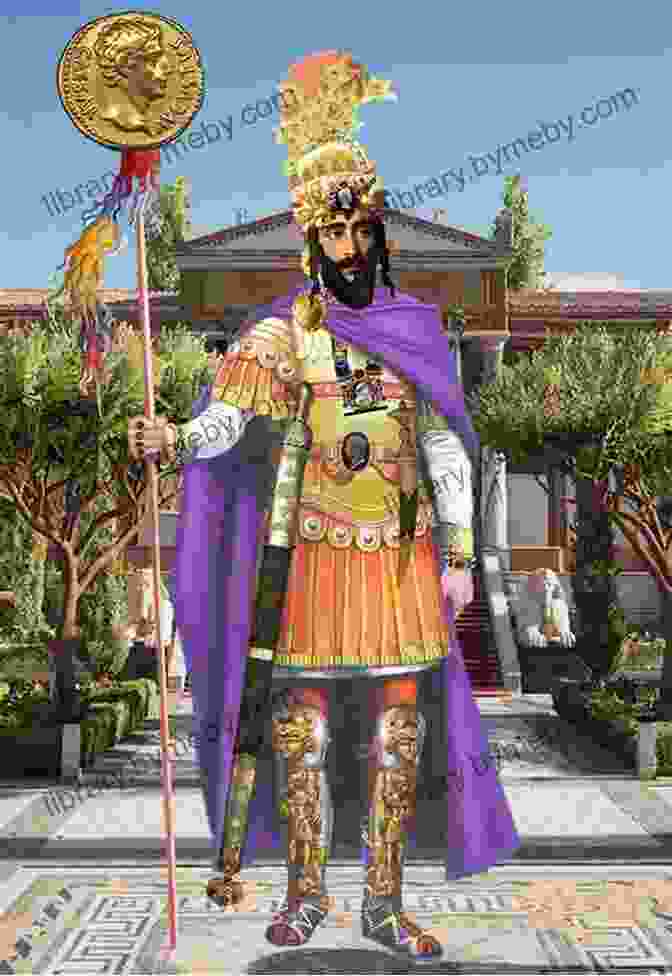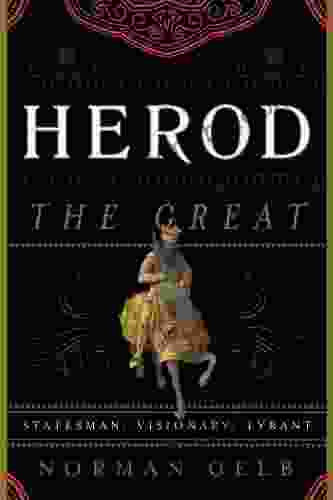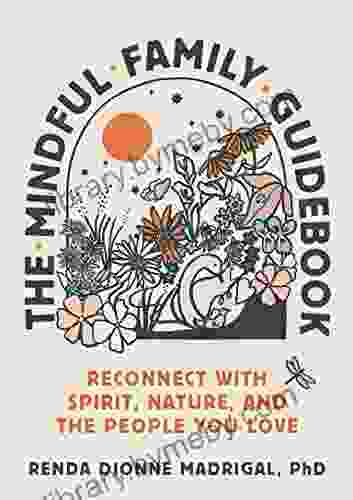Herod the Great: Statesman, Visionary, Tyrant - A Historical Exploration

Herod the Great, the enigmatic ruler of Judea from 37-4 BCE, has captivated historians and scholars for centuries. His reign was marked by both grand achievements and ruthless brutality, leaving a complex and controversial legacy that continues to be debated today. This comprehensive article aims to provide an in-depth exploration of Herod's life, uncovering the intricacies of his character and examining the profound impact he had on the history of the region.

4.6 out of 5
| Language | : | English |
| File size | : | 783 KB |
| Text-to-Speech | : | Enabled |
| Screen Reader | : | Supported |
| Enhanced typesetting | : | Enabled |
| Word Wise | : | Enabled |
| Print length | : | 228 pages |
Early Life and Rise to Power
Born in 74 BCE to a wealthy and influential family, Herod's early life was marked by political intrigue and instability. He rose to power through a combination of ambition, cunning, and opportunistic alliances. In 40 BCE, he was appointed by the Roman Senate as King of Judea, effectively ending the Hasmonean dynasty that had ruled the region for over a century.
Building Projects and Architectural Marvels
One of Herod's most enduring legacies is his extensive building projects. He transformed Jerusalem into a magnificent city, constructing opulent palaces, temples, and public works. The most famous of these structures is the Temple Mount, which included the iconic Second Temple and became a central religious and cultural site for centuries to come. Other notable projects include the fortress of Masada, the port city of Caesarea Maritima, and the summer palace of Herodium.
Political Acumen and Roman Relations
Herod was a skilled politician who maintained amicable relations with the Roman Empire. He understood the importance of Roman support for his reign and made strategic alliances with key figures, most notably Octavian (later Emperor Augustus). Through diplomacy and cunning, he managed to preserve Judea's autonomy while ensuring the loyalty and protection of the Romans.
Religious Policies and Suppression
Herod's religious policies were marked by both tolerance and suppression. While he initially allowed freedom of worship for various religions, his later years saw a shift towards the persecution of non-Jewish groups and the strict enforcement of Jewish law. The exact reasons for this shift remain unclear, but it is believed to have been motivated by a combination of political expediency and personal beliefs.
Personal Life and Ruthless Reign
Herod's personal life was characterized by both splendor and tragedy. He married multiple times, forming alliances with influential families. However, his marriages were often marred by suspicion, jealousy, and violence. Herod's rule was also marked by brutality and paranoia. He executed perceived rivals, including family members, and suppressed any potential threats to his authority. These actions earned him a reputation as a tyrant, casting a shadow over his accomplishments.
Legacy and Impact
Herod the Great's legacy remains a subject of debate and fascination. His building projects and architectural achievements transformed the landscape of Judea and continue to be admired as masterpieces of Roman architecture. However, his cruelty, paranoia, and religious intolerance have tarnished his reputation. Nonetheless, Herod's impact on the history of the region cannot be overstated. His reign laid the foundation for the Roman-influenced era in Judea and played a significant role in the rise of Christianity.
Herod the Great was a complex and enigmatic figure whose legacy continues to be debated today. His achievements as a statesman, visionary, and builder are marred by his ruthless tyranny and religious persecution. Through an exploration of his life, character, and impact, we gain a glimpse into one of the most fascinating and controversial rulers of antiquity.
4.6 out of 5
| Language | : | English |
| File size | : | 783 KB |
| Text-to-Speech | : | Enabled |
| Screen Reader | : | Supported |
| Enhanced typesetting | : | Enabled |
| Word Wise | : | Enabled |
| Print length | : | 228 pages |
Do you want to contribute by writing guest posts on this blog?
Please contact us and send us a resume of previous articles that you have written.
 Book
Book Novel
Novel Page
Page Chapter
Chapter Text
Text Story
Story Genre
Genre Reader
Reader Library
Library Paperback
Paperback E-book
E-book Magazine
Magazine Newspaper
Newspaper Paragraph
Paragraph Sentence
Sentence Bookmark
Bookmark Shelf
Shelf Glossary
Glossary Bibliography
Bibliography Foreword
Foreword Preface
Preface Synopsis
Synopsis Annotation
Annotation Footnote
Footnote Manuscript
Manuscript Scroll
Scroll Codex
Codex Tome
Tome Bestseller
Bestseller Classics
Classics Library card
Library card Narrative
Narrative Biography
Biography Autobiography
Autobiography Memoir
Memoir Reference
Reference Encyclopedia
Encyclopedia Walter Harding
Walter Harding Mark Gruner
Mark Gruner Stefan H Thomke
Stefan H Thomke Stephen Pizzo
Stephen Pizzo Monica Gribben
Monica Gribben Robert Rolih
Robert Rolih Melissa Abramovitz
Melissa Abramovitz Phil Bourque
Phil Bourque Peterson S
Peterson S Thomas Gryta
Thomas Gryta Tom Gjelten
Tom Gjelten Larissa Larsen
Larissa Larsen Suzuki Aika
Suzuki Aika Tim Judah
Tim Judah Norma Macdonald
Norma Macdonald Lori Rea
Lori Rea Moti Kfir
Moti Kfir Robert Rath
Robert Rath Sharon F Patton
Sharon F Patton Sherine Hamdy
Sherine Hamdy
Light bulbAdvertise smarter! Our strategic ad space ensures maximum exposure. Reserve your spot today!

 Dustin RichardsonMy Blood Divides And Unites: A Journey of Identity, Belonging, and the...
Dustin RichardsonMy Blood Divides And Unites: A Journey of Identity, Belonging, and the...
 Geoffrey BlairMandela and the General: An Epic Tale of Truth, Reconciliation, and the Power...
Geoffrey BlairMandela and the General: An Epic Tale of Truth, Reconciliation, and the Power... Vladimir NabokovFollow ·2.2k
Vladimir NabokovFollow ·2.2k Banana YoshimotoFollow ·17.9k
Banana YoshimotoFollow ·17.9k Terry PratchettFollow ·11.6k
Terry PratchettFollow ·11.6k Hudson HayesFollow ·17.3k
Hudson HayesFollow ·17.3k Danny SimmonsFollow ·15.3k
Danny SimmonsFollow ·15.3k Ivan TurgenevFollow ·14.7k
Ivan TurgenevFollow ·14.7k Diego BlairFollow ·13k
Diego BlairFollow ·13k Ira CoxFollow ·9.9k
Ira CoxFollow ·9.9k

 Clay Powell
Clay PowellDiscover the Enigmatic Beauty and Profound Meaning in...
An Exploration of Emptiness, Fulfillment,...

 Brenton Cox
Brenton CoxThe Life and Times of the Woman Who Changed Abortion: The...
Norma McCorvey, the woman known...

 Darius Cox
Darius CoxBest 60 Short Hairstyles For Women With Thick Hair: A...
Embracing the beauty of...

 John Parker
John ParkerThe Healthy Pregnancy Book: Your Essential Guide to a...
Pregnancy is a...
4.6 out of 5
| Language | : | English |
| File size | : | 783 KB |
| Text-to-Speech | : | Enabled |
| Screen Reader | : | Supported |
| Enhanced typesetting | : | Enabled |
| Word Wise | : | Enabled |
| Print length | : | 228 pages |












